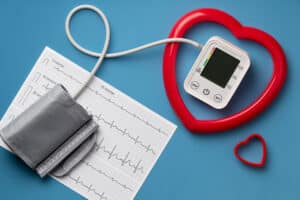Your path to a healthier heart starts here.
Melbourne Heart Care is a trusted partner in cardiac care and arrhythmia management. If you, or a loved one, have an abnormal heart rhythm, our cutting-edge radiofrequency catheter ablation procedure may help.
Contact Melbourne Heart Care and make an appointment with one of our cardiologists today.
What is radiofrequency catheter ablation?
Radiofrequency cardiac ablation is a procedure designed to treat arrhythmias (an abnormal heart rhythm) that can disrupt your daily life. By pinpointing and correcting the source of these irregularities, our specialists can help restore your heart’s rhythm and improve its overall function.
The ablation involves specialised wires or catheters guided into the heart, where high-frequency, low-voltage electricity delivers controlled heat to the cardiac muscle. This damages the targeted tissue, disrupting its ability to generate or transmit electrical impulses, effectively treating the heart rhythm disorder.
What is a normal heart rhythm?
In a normally functioning heart, the “conduction” system (electrical pathways) stimulates the cardiac tissue, causing the contraction or the squeezing of the heart to pump blood.
An electrical impulse begins from specialised cells known as the sinus node, situated in the right atrium (upper right chamber). This is known as the natural pacemaker of the heart and is responsible for ensuring your heart is in a regular heart rhythm (sinus rhythm).
These electrical impulses travel across the upper chambers of the heart, or atria, and then reach the atrioventricular node (AV node), positioned between the atria and the ventricles (the lower chambers) of the heart that are responsible for pumping blood around your body.
From here, the impulses continue along conduction fibres that spread throughout the ventricles, the heart’s primary pumping chambers. This sequential stimulation of cardiac muscle cells generates the heartbeat, or the pumping action of your heart. This propels blood from the heart into arteries and circulates it throughout the body. The resulting pulse, which can be felt, corresponds to this heartbeat.
However, if there is an irregularity, or short circuit, in the heart’s conduction system then you may experience an irregular heart beat.

An abnormal heart rhythm can cause shortness of breath, dizziness, palpitations, chest pain or fainting. If you are experiencing any of these you should consult with your doctor.
Why would someone need a catheter ablation procedure?
Arrhythmias can lead to various health complications, affecting your quality of life. Cardiac ablation offers a targeted solution, often recommended when medications aren’t fully effective. It’s a minimally invasive procedure that addresses the root cause of arrhythmias, providing lasting relief.
Most often, a radiofrequency cardiac ablation is used for fast heartbeats that originate in the atria (upper chambers) of your heart, or the connecting fibres between the atria and ventricles (eg AV node). This group of rapid abnormal heart rhythm disorders are known as supraventricular tachycardia, or SVTs. The different types of SVT are:
- Atrial Fibrillation (AF)
- Atrial Flutter
- Atrial Tachycardia
- AV Nodal Reentrant Tachycardia
- AV Reentrant Tachycardia
What causes these abnormalities?
There are several different risk factors for developing these cardiac disorders:
- Heart attack (can lead to damage or enlargement of the atria)
- Abnormal heart valves
- Heart failure
- Coronary artery disease
- High blood pressure

In the electrophysiology laboratory, the doctor will pass a flexible wire up into your heart and deliver energy in the form of heat (radiofrequency) to the area causing issues to restore sinus rhythm.
What is the success rate of a cardiac ablation?
For most types of arrhythmia, a cardiac ablation has a success rate of 90-98%. This eliminates the need for long-term medications or more invasive interventions such as open-heart surgery.
How is a catheter ablation performed?
Radiofrequency catheter ablation is a minimally-invasive procedure that can be performed as a day procedure or you may need to stay in the hospital for a night.
Pre-procedure
You will be sent pre-operative instructions that you need to follow. This will include:
- What medications you need to stop and when.
- When you need to fast from (no eating or drinking).
- What to bring into the hospital on the day of your procedure.
The radiofrequency ablation
Before the procedure commences, you will receive a sedative medication through an intravenous drip. Once this has taken effect, small flexible catheters will be inserted into the vein or artery in your right groin and using fluoroscopy (X-ray) the electrophysiologist will guide a plastic wire into your heart chambers. Different parts of your heart will be tested to try and provoke the irregular heart rhythm so your doctor can pinpoint the source of the abnormal electrical signals.
Once identified, the targeted heart tissue responsible for your arrhythmia will be treated using radiofrequency energy or cryoablation. This creates scar tissue that is no longer able to conduct an electrical impulse, therefore preventing the abnormal rhythm.
Throughout the procedure, you will be connected to many ECG monitoring electrodes and other equipment so we can closely monitor your heart rate and rhythm, blood pressure and oxygen levels. At the end, your doctor will attempt to provoke the irregular rhythm to determine if the procedure has worked. If the arrhythmia persists, they will use additional radiofrequency energy.
The length of the procedure varies, depending on factors like the type of arrhythmia, but typically lasts between one and two hours.
Post-procedure aftercare and recovery
Following the procedure, you will be taken to a recovery area to wait for the sedative medication to wear off. During this time, you will:
- Need to stay in bed for several hours, lying on your back with your legs straight.
- Have your heart rate and blood pressure closely observed.
- Be monitored for signs of bleeding from the catheter site.
Most patients are able to go home after several hours, however some will need to stay in hospital overnight. Either way, you will be provided with post-operative instructions to follow to ensure your recovery. This will include no heavy lifting or exercise for a time, take aspirin (blood thinner) to prevent blood clots and information about any other medications that may be required.
Risks and complications
Any invasive procedure carries certain risks and potential complications. With radiofrequency cardiac procedures these include:
- Issues associated with the insertion of the catheters through blood vessels, such as bleeding, infection, blood clot formation, obstruction of blood flow, or injury to the blood vessels.
- Injury to the heart muscle or heart wall, such as perforation (cardiac tamponade) or damage to a valve.
- Risk of blood clots travelling to your lungs or brain.
- Heart block, where the electrical impulse can’t travel from the heart’s upper to lower part. Usually this resolves, however if it doesn’t you may require a permanent pacemaker during the procedure (this is rare, occurring in 0.1% of cases, but a little more common in arrhythmias near the AV node).
- Radiation exposure, although this is very limited.
- Mortality occurs in less than 0.1% of all cases.
Your cardiologist will discuss these in depth with you prior to your procedure.
Dedicated cardiac ablation specialists
At Melbourne Heart Care, our dedicated cardiac rhythm management team brings extensive expertise to the diagnosis and management of abnormal rhythm disorders. We offer personalised care, customised to individual needs with an emphasis on collaborative efforts with other professionals. We are committed to providing compassionate and empathetic care, in a cutting-edge facility to help you every step of the way.

